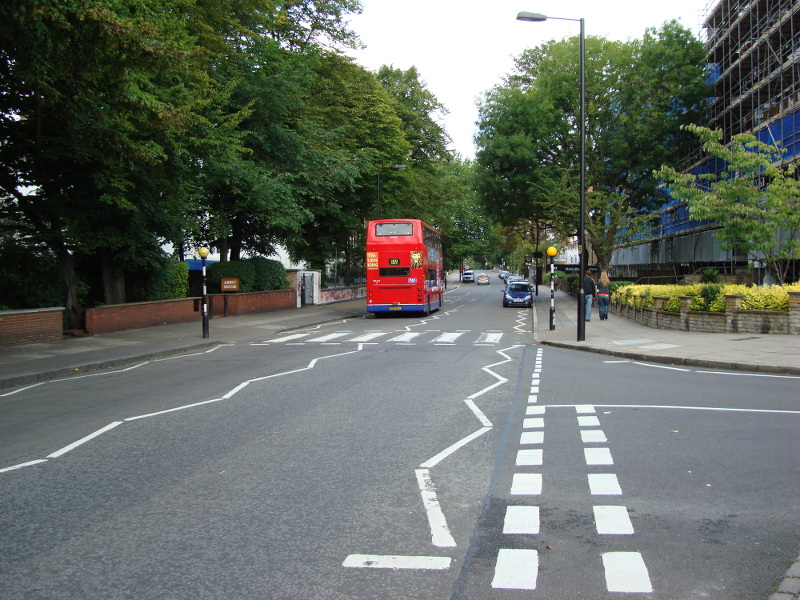Contents
第26章 名詞構文
英語には、普通の動詞で言い表すところを、名詞中心に表現する場合がある。口語表現の中に多く見られます。
ビートルズなどの洋楽歌詞に特に興味がない方は、下記の引用部分を飛び越えて文法のセクションへ飛んでください。↓
| Let me have a look at it. 見ることを持つ→ちょっとそれを見せて |
| He is a fast runner. 速い走者→彼は走るのが速い |
いずれも名詞を含む表現になっています。この章ではこういう名詞中心の英語表現の型を一通り見てみましょう。
ビートルズの歌詞の中の名詞構文は下記のものを見つけました。do the gardenやdo harmなどです。
| Paperback Writer | will you take a look(見てくれませんか) |
| She’s Leaving Home | Waiting to keep the appointment she made(約束を守って待っている) |
| When I’m Sixty-Four | doing the garden, digging the weeds(庭の手入れをしたり、雑草を抜いたり) |
| Oh! Darling | I’ll never do you no harm(決して君を傷つけたりしない) |
| Magical Mystery Tour | Roll up, to make a reservation(集まれ、予約をするために) |
| The Continuing Story of Bangalow Bill | Bill and his elephants were taken by surprise(ビルと彼の象は驚いた) |
| How Do You Sleep (John LenonのソロアルバムImagineの中の1曲) |
So Sgt. Pepper took you by surprise(そうサージェントペッパーは君を驚かせただろう) |
| Every Breath You Take (The Police) |
Every breath you take(君が息づかいするたびに) Every move you make(君が動くたびに) |
26-1. have a lookの形
主に、do, give, have, make, takeなどの基本動詞を使って、「動詞+冠詞(所有格)+名詞」という形をとります。
| The child gave a cry of hunger.(その子は空腹のために泣き叫んだ) |
| We made an attempt to reach the town in time.(私達は時間に遅れずに町に着けるよう努力した)<不定詞がつく> |
| Since the girls spent so much time cooking, we told them that we boys would do the dishes.(女子が料理にあれだけの時間をかけたんだから、我々男子で食器の後片付けをしようと言った) |
| ≪類例≫do one’s [the] hair [teeth] (髪を結う、歯を磨く)、 give an answer(答える)、 give a 〜 look(〜の顔つきをする)、have a bath(chat, drink, etc.)(入浴(談笑、飲酒などを)する)、have a try(やってみる)、take a look(見る)、take a bite(かじる) 上の表現の中には、名詞と同形の動詞で言い換えられるものが多い。give a cry=cry, make an attempt=attemptなど。 |
26-2. He is a fast runnerの形
主に人の能力を表す表現に使われ、多くの場合「形容詞+動詞-er(〜する人)」という形をとります。
| He is a good listener(あの人は聞き上手だ) |
| She is a good swimmer.(彼女は泳ぎがうまい) =She is good at swimming. |
| They are both bad tennis players.(彼らは2人ともテニスが下手だ) |
| 次のように、動詞中心の表現の方が普通の場合もある。 He teaches mathematics.= He is a mathematics teacher [a teacher of mathematics].(あの人は数学の先生だ) |
26-3. to our (great) surpriseの形
「to+所有格+(greatなど「程度」の形容詞+)感情を表す名詞」という形をとり、「〜が喜んだ(悲しんだ、驚いた)ことには」の意味を表します。
| To my great delight, our experiment was a success.= I was very much delighted to see that our experiment was a success.(とても嬉しかったことに我々の実験は成功した) |
| To her disappointment, his letter didn’t come.= She was disappointed to know that his letter did not come.(彼女ががっかりしたことには、彼の手紙は来なかった) |
26-4. his absence from the partyの形
動詞や形容詞から派生した抽象名詞を使った表現で、やや形式張った言い方になります。論説文などに多く見られるものです。これらは元の動詞や形容詞に戻して考えると理解しやすいです。
| his absence from the party(彼がパーティーに出なかったこと) He is [was] absent from the party.(彼はパーティーに出ない[出なかった]) |
| He realized his willingness to go there.<形容詞からのもの>= He realized that he was willing to go there. (彼はそこへ行きたいという気持ちを実現した) 抽象名詞に付く所有格が、意味上の主語になっていることがわかる。 |
| We are surprised at the news of her readiness to go there = We are surprised at the news that she is ready to go there. <形容詞からのもの>(彼女はそこに行く用意ができているという知らせに私たちは驚いています) |
| The appearance of the father in the door-way settled everything. <動詞からのもの> = When the father appeared in the door-way, everything was settled.(父親が戸口に姿を見せたので、万事が収まった) of〜が意味上の主語を表していることに注意。appearは自動詞。 |
| His application for the post was rejected. <動詞からのもの>= He applied for for the post but it was rejected.(彼はその地位を志願したが、拒否された) |
| Columbus’s discovery of America was a big event in history.<動詞からのもの> = Colubmus discovered America and it was a big event in history.(コロンブスがアメリカを発見したことは歴史上大きな出来事だった) |
他動詞から派生した名詞の場合、of〜は意味上の目的語です。
なお、他動詞の目的語がof以外で表されている次の例もあります。
entrance into the room(←enter the room)
attendance at the meeting(←attend the meeting)
26-5. the fact of your meeting himの形
「名詞+of (one’s)〜ing」の形をとります。つなぎの前置詞ofは、同格関係を示します。
| the fact of your meeting him the fact that you met him (君が会ったという事実) |
このように、この型は同格のthat節から出たもので、that節内の動詞が動名詞で示されます。
| The house gives no evidence of having been occupied.=The house gives no evidence that it has been occupied.(その家は今までに(人が)住んでいた(という)形跡はない) |
| The likelihood of his starving is strong.= The likelihood that he will starve is strong.(彼が飢えそうだという見込みが強い) |
26-6. at the sight of; at the thought of「〜を見て」,「〜を思って」
| He ran away at the sight of the policeman.= He ran away when he saw the policeman.(彼は警察官の姿を見ると逃げ出した) |
| She shuddered at the (mere) thought of war.= She shuddered when she thought of war.(彼女は戦争と思っただけで身震いした) |
次は無生物主語について見てみましょう。

2021.04.21
第27章 無生物主語を含む英文
第27章 無生物主語を含む英文 英語では一部の動詞以外は「生物」でも「無生物」でも主語にすることが多いです。この章では、このような英語...